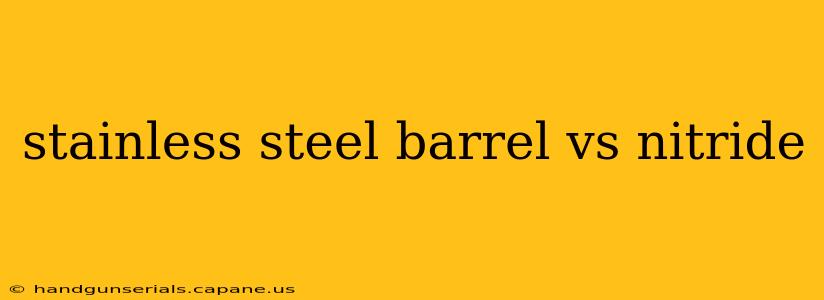Choosing the right barrel for your firearm can significantly impact its performance, longevity, and overall shooting experience. Two popular options often top the list: stainless steel and nitride barrels. While both offer excellent durability, they possess distinct characteristics that cater to different needs and preferences. This in-depth comparison will explore the advantages and disadvantages of each, helping you make an informed decision.
Stainless Steel Barrels: The Tried and True Choice
Stainless steel barrels have long been a mainstay in the firearms industry, prized for their corrosion resistance and overall durability. This material's inherent strength allows for a wide range of applications, from hunting rifles to target pistols.
Advantages of Stainless Steel Barrels:
- Corrosion Resistance: Stainless steel's inherent resistance to rust and corrosion makes it ideal for use in various climates and conditions. This is especially beneficial for hunters and outdoor enthusiasts who may expose their firearms to moisture and harsh elements.
- Durability: Stainless steel is a robust material that can withstand considerable wear and tear. It's less prone to damage from impacts or scratches compared to some other barrel materials.
- Wide Availability: Stainless steel barrels are readily available for a wide range of firearms and calibers, making them a convenient choice for many shooters.
- Consistent Accuracy: When properly manufactured, stainless steel barrels offer excellent accuracy and precision, making them suitable for both recreational and competitive shooting.
Disadvantages of Stainless Steel Barrels:
- Cleaning: While durable, stainless steel can be more challenging to clean than some other barrel finishes. Fouling can sometimes adhere more stubbornly to the surface.
- Weight: Stainless steel barrels are generally heavier than those made from other materials, potentially affecting the overall balance and handling of the firearm, especially in lighter-weight platforms.
- Cost: Depending on the grade and manufacturing process, stainless steel barrels can sometimes be slightly more expensive than other options.
Nitride Barrels: A Modern Approach to Durability
Nitriding is a surface treatment that significantly enhances the properties of the underlying steel. This process creates a hard, wear-resistant surface on the barrel, offering several advantages over traditional stainless steel.
Advantages of Nitride Barrels:
- Increased Hardness: The nitriding process dramatically increases the barrel's surface hardness, leading to improved wear resistance and extended barrel life. This translates to fewer cleaning cycles and potentially greater accuracy over time.
- Corrosion Resistance: Nitride barrels boast excellent corrosion resistance, comparable to or even surpassing that of stainless steel in many cases.
- Reduced Friction: The nitrided surface exhibits lower friction, contributing to smoother cycling and potentially less fouling buildup. This can be beneficial for both semi-automatic and automatic firearms.
- Easier Cleaning: Due to the lower friction and smoother surface, nitride barrels are often considered easier to clean than stainless steel barrels. Fouling is less likely to adhere as strongly.
Disadvantages of Nitride Barrels:
- Potentially Higher Initial Cost: The nitriding process adds to the overall cost of manufacturing, resulting in potentially higher prices for nitride barrels.
- Less Common: While gaining popularity, nitride barrels are still less widely available than stainless steel barrels for some firearms and calibers.
- Sensitivity to Damage: Although extremely hard, the nitride layer is relatively thin, making it potentially more susceptible to damage from extremely hard impacts compared to a thick stainless steel barrel.
The Verdict: Choosing the Right Barrel for You
The choice between a stainless steel and nitride barrel ultimately depends on your specific needs and priorities.
-
Choose Stainless Steel if: You prioritize affordability, readily available options, and a proven track record of durability in various conditions. Corrosion resistance and overall ruggedness are your top concerns.
-
Choose Nitride if: You value enhanced wear resistance, easier cleaning, and potentially improved accuracy over the long term. A smoother cycling action and superior corrosion resistance are important to you, and you are willing to pay a potentially higher initial cost.
Ultimately, both stainless steel and nitride barrels offer excellent performance. Understanding the nuances of each material will empower you to make a selection that perfectly aligns with your shooting style and firearm requirements. Consulting with a knowledgeable firearms professional can further assist in this decision-making process.

